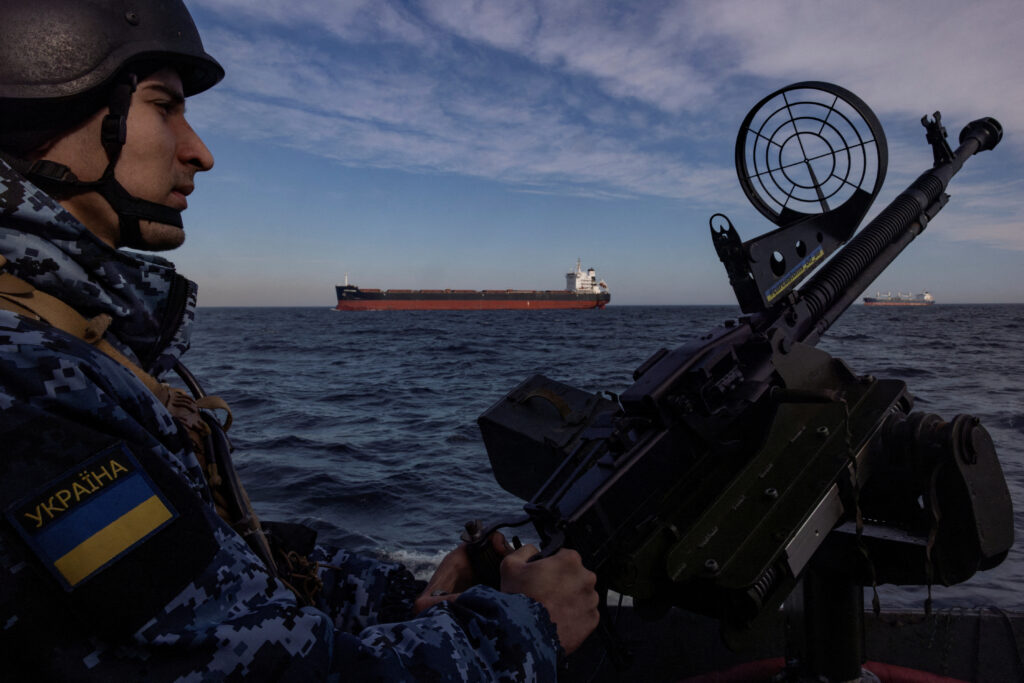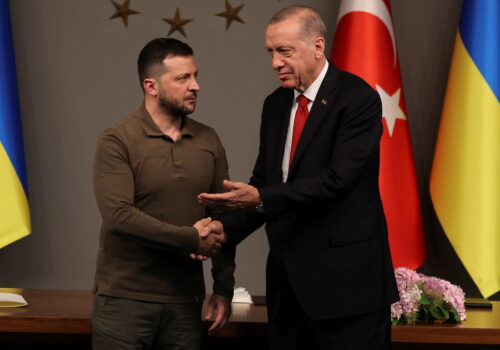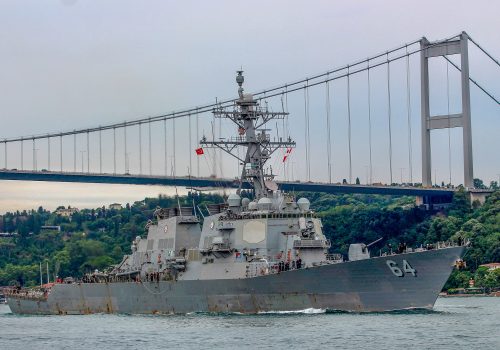Why Washington’s approach to Black Sea security may be about to change—for the better
Washington’s engagement with the Black Sea has ebbed and flowed in the post-Cold War era. The lack of consistent focus has contributed to relative insecurity in the littoral states and emboldened Russian aggression.
But as the region continues to be destabilized by Russia’s war on Ukraine, there is a sign that this period of US neglect may be ending. This sign comes in the form of Section 1247 of the National Defense Authorization Act for Fiscal Year 2024 (NDAA), which US President Joe Biden signed on December 22 last year, authorizing a total national security budget of $886 billion.
Section 1247 instructs the National Security Council to develop a Black Sea security and development strategy across government agencies. But until that strategy is released, Section 1247 outlines five ways the United States will aim to support the region: “(1) to increase coordination with [NATO] and the [European Union (EU)]; (2) to deepen economic ties; (3) to strengthen energy security; (4) to support efforts to bolster their democratic resilience; and (5) to enhance security assistance with regional partners in accordance with the values and interests of the United States.”
These aims will require a whole-of-government approach in addition to participation from the private sector, for example through private investment in projects across Black Sea regional partners—which the NDAA lists as Bulgaria, Georgia, Moldova, Romania, Turkey, and Ukraine.
Some initial assessments can be made about the United States’ five aims.
US coordination with NATO and the EU
The Black Sea region’s most pressing concern is Ukraine, which is struggling to fend off Russia. Though Ukraine has already received considerable military and economic support from the West, this aid will continue in the form of the EU’s recently approved fifty-billion-euro package. The US Congress is still in gridlock over additional aid. Ultimately, Ukraine’s role as a bulwark against Russian aggression is too important for Washington and Brussels to ignore.
Over the long term, there is a need for greater military capability and interoperability, as well as a more resilient civil-military infrastructure, across the Black Sea region. While all the littoral states would benefit from a greater US presence, two nations will be particularly important for achieving the United States’ coordination goals. Turkey is not only home to the second-largest military in NATO; it is also the guardian of the straits that connect the Black Sea to the Mediterranean Sea (and beyond), so any US strategy must include Ankara. Therefore, rapprochement between Ankara, Washington, and Brussels will be necessary. Romania’s size, strategic location, and strong transatlantic ties have positioned it to become a military and economic hub for the region, particularly as more NATO assets are deployed there.
Deepening economic ties
Section 1247 calls for enhancing US business ties with Black Sea regional partners in part to reduce the impact of Russian and Chinese “economic coercion.” It is here where the various chambers of commerce—as well as the US Agency for International Development (USAID) and other US government development organs—can contribute by coordinating with stakeholders, lending institutions, and entrepreneurs.
Corruption and entrenched bureaucracies prevalent in the region inhibit growth and investment and undermine public confidence in national institutions. There have been improvements, though. Hopefully, increased attention from Washington will provide the impetus for the regional states to implement and enforce additional serious anticorruption measures.
Strengthening energy security
There is a need to strengthen the wider Black Sea region’s energy security by enhancing source diversification and reducing or eliminating dependence on Russia. Due to their geographical location and historical ties with Russia, most countries in the region are dependent on Russia for oil and gas imports. With the price cap placed on Russian oil—designed to reduce money flows to Moscow—these countries have worked on reducing their dependences. However, because of waivers, lax controls, or illegal trading activities, money from around the world still flows into the Kremlin’s coffers.
Moldova’s efforts to wean itself from Russian energy have had some success, with notable Romanian support. Ankara has worked to diversify its energy sources—although Turkey is proceeding with an agreement it signed with Russia that allows Russian state nuclear energy company Rosatom to build, own, and operate a nuclear power plant in Akkuyu, drawing criticism from experts in the West. Moreover, Russian energy still flows into Turkey. For example, Turkey has become the second-largest importer of Russian fossil fuels.
Finally, NATO’s lack of pipeline infrastructure in Eastern Europe is a potential vulnerability, meaning that it may not be able to rapidly move fuel to forward-deployed forces in the Black Sea region. Addressing that vulnerability will require a major effort that includes increasing oil and gas production by Black Sea states, exploiting renewable energy sources, and expanding the distribution network through expanded pipeline, road, rail, and barge infrastructure. This will be expensive, controversial, and time consuming, requiring funding, strong diplomacy, and patience.
Bolstering democratic resilience
Russia’s relentless malign influence campaigns are difficult to counter for small states without the vast resources to do so. A comprehensive, multinational response is needed to blunt Russian propaganda and disinformation in the Black Sea region. The NDAA advocates for an increase in independent media and US-supported media initiatives in the region, in addition to initiatives led by the State Department and USAID, to “combat foreign malign influence in the region.” This also presents the opportunity to leverage US-owned news network Voice of America and US-supported media organization Radio Free Europe/Radio Liberty. The United States could look to incorporate other resources, such as NATO’s strategic communications arm—including its Strategic Communications Centre of Excellence based in Riga, Latvia.
Enhancing security assistance with regional partners
The longstanding mistrust between the littoral states creates an indispensable role for the United States. Indeed, the United States has encouraged collaboration on Black Sea security among the region’s states. Such collaboration is on the rise, most recently seen in January when Turkey, Bulgaria, and Romania agreed to conduct demining operations in the Black Sea once Russia’s war in Ukraine comes to an end. Georgia is positioning itself as a key player in the middle corridor—promoting itself as a trusted partner in Eastern Europe’s trade system—by improving its port facilities and ancillary infrastructure. Georgia is also the proposed source for a potential undersea power and internet cable to Romania. Additionally, the strategy calls for assessments on “sustainable, long-term” food-security solutions. Cooperation between Ukraine and the countries along its Black Sea shipping corridor (Romania, Bulgaria, and Turkey) has allowed shipping, including millions of tons of agricultural goods such as grain, to continue along the Black Sea’s western coast within each state’s territorial waters. The United States’ aim to enhance security assistance with these regional partners is an opportunity for Washington to solidify its role as a trusted third party in such cooperation.
Section 1247 of the NDAA appears to be the beginning of an effort to bring stability to the United States’ traditionally unpredictable and uneven commitment to lend focus to the Black Sea region. However, Russia will continue to present a threat to the region. Thus, the United States must solidify its plans for engagement in order to change Russia’s perception of the political and economic costs of its activities and, ultimately, to deter the Kremlin.
Arnold C. Dupuy is a nonresident senior fellow at the Atlantic Council IN TURKEY, a faculty member of the US Naval Postgraduate School, and chair of the NATO Science and Technology Organization’s SAS-183, “Energy Security Capabilities, Resilience and Interoperability.” Follow him on LinkedIn.
Further reading
Tue, Mar 5, 2024
The Ukraine-Turkey defense partnership with the potential to transform Black Sea and Euro-Atlantic security
TURKEYSource By Pınar Dost
An expanded defense partnership between Ukraine and Turkey has great potential to secure the Black Sea and help bolster NATO’s efforts in the region.
Thu, Feb 22, 2024
Listen closely to Putin: His imperial ambitions could include Turkey
TURKEYSource By Yevgeniya Gaber
The historical revisionism, imperial ambitions, and arbitrary interpretation of state borders displayed in Putin’s interview with Tucker Carlson should ring a warning bell for Ankara.
Tue, Dec 5, 2023
The Biden administration finally has a Black Sea security strategy. It’s what comes next that matters.
New Atlanticist By Arnold C. Dupuy
The Biden administration’s strategy on Black Sea security is coming into focus. It will take time and strong partnerships to execute.
Image: A serviceman of Ukraine’s coast guard mans a gun on a patrol boat as a cargo ship passes by in the Black Sea, amid Russia’s attack on Ukraine, February 7, 2024. REUTERS/Thomas Peter




